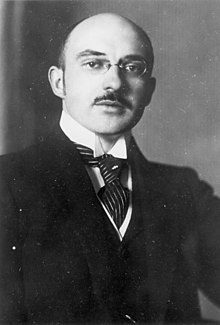
Back ماكس اروين فون شويبنر ريختر ARZ Макс Ервин фон Шойбнер-Рихтер Bulgarian Max von Scheubner-Richter Czech Max Erwin von Scheubner-Richter German Max Erwin von Scheubner-Richter Spanish Max Erwin von Scheubner-Richter Finnish Max Erwin von Scheubner-Richter French Max Erwin von Scheubner-Richter Scots/Gaelic Max Erwin von Scheubner-Richter Hungarian Max Erwin von Scheubner-Richter ID
You can help expand this article with text translated from the corresponding article in German. (December 2009) Click [show] for important translation instructions.
|
Max Erwin von Scheubner-Richter | |
|---|---|
 Max Erwin von Scheubner-Richter | |
| Birth name | Ludwig Maximilian Erwin Richter |
| Born | 21 January 1884 Riga, Russian Empire |
| Died | 9 November 1923 (aged 39) Munich, Weimar Republic |
| Allegiance | |
| Branch | |
| Years of service | 1914–1918 |
| Unit | 7th Bavarian Chevauleger-Regiment Straubing (August–November 1914) |
| Battles/wars | Russian Revolution of 1905 World War I Beer Hall Putsch |
Ludwig Maximilian Erwin von Scheubner-Richter (Latvian: Ludvigs Rihters) (21 January [O.S. 9] 1884 – 9 November 1923) was a Baltic German political activist and an influential early member of the Nazi Party.
Scheubner-Richter was a Baltic German from Russia and fought against the Russian Revolution of 1905 before serving in the Imperial German Army during World War I, witnessing and producing documentation of the Armenian genocide. He was the founder of the Aufbau Vereinigung and a leading ideologist of Nazism at the beginning of the Interwar period. Scheubner-Richter became a key influence and close associate of Adolf Hitler, and an activist of the Nazi Party instrumental in securing financing for its early stages.
Scheubner-Richter was killed during the Beer Hall Putsch in November 1923 and part of Hitler's Mein Kampf was dedicated to him. He was elevated to status of Blutzeuge ("blood witness") and national hero upon the founding of Nazi Germany in 1933. Of the 15 Nazis who were killed by the police during the coup, Hitler described Scheubner-Richter as the only one who was "irreplaceable".
© MMXXIII Rich X Search. We shall prevail. All rights reserved. Rich X Search